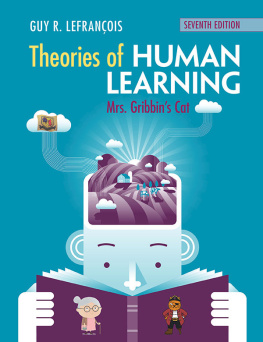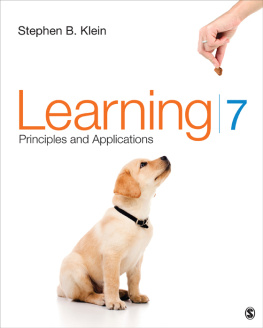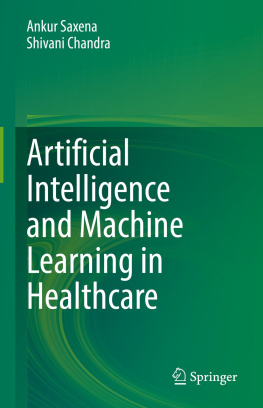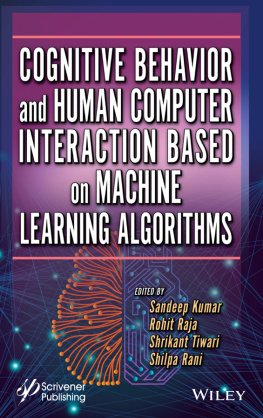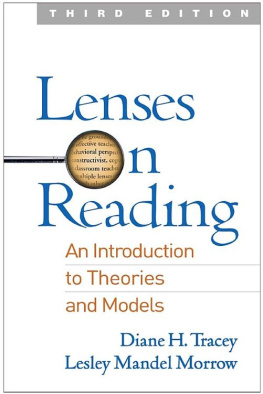Mrs. Gribbins Cat
Both a serious academic text and an intriguing story, this seventh edition reflects a significant update in research, theory, and applications in all areas. It presents a comprehensive view of the historical development of learning theories from behaviorist through to cognitive models. The chapters also cover memory, motivation, social learning, machine learning, and artificial intelligence.
The authors highly entertaining style clarifies concepts, emphasizes practical applications, and presents a thought-provoking, narrator-based commentary. The stage is given to Mrs. Gribbin and her swashbuckling cat, who both lighten things up and supply much-needed detail. These two help to explore the importance of technology for simulating human cognitive processes and engage with current models of memory. They investigate developments in, and applications of, brain-based research and plunge into models in motivation theory, to name but a few of the adventures they embark upon in this textbook.
Guy R. Lefranois is Honorary Professor in the Department of Educational Psychology at the University of Alberta, Canada. He has published over 50 titles, including a number of best-selling textbooks in their respective fields.
Mrs. Gribbins Cat
Guy R. Lefranois
University Printing House, Cambridge CB2 8BS, United Kingdom
One Liberty Plaza, 20th Floor, New York, NY 10006, USA
477 Williamstown Road, Port Melbourne, VIC 3207, Australia
314321, 3rd Floor, Plot 3, Splendor Forum, Jasola District Centre, New Delhi 110025, India
79 Anson Road, #0604/06, Singapore 079906
Cambridge University Press is part of the University of Cambridge.
It furthers the Universitys mission by disseminating knowledge in the pursuit of education, learning, and research at the highest international levels of excellence.
www.cambridge.org
Information on this title: www.cambridge.org/9781108484633
DOI: 10.1017/9781108696333
Fifth edition 2006 Wadsworth, Cengage Learning
Sixth edition 2012 Wadsworth, Cengage Learning
Seventh edition Cambridge University Press 2020
This publication is in copyright. Subject to statutory exception and to the provisions of relevant collective licensing agreements, no reproduction of any part may take place without the written permission of Cambridge University Press.
Fifth edition 2006
Sixth edition 2012
Seventh edition 2020
Printed in the United Kingdom by TJ International Ltd, Padstow Cornwall 2020
A catalogue record for this publication is available from the British Library.
ISBN 978-1-108-48463-3 Hardback
ISBN 978-1-108-73599-5 Paperback
Additional resources for this publication at www.cambridge.org/lefrancois7ed
Cambridge University Press has no responsibility for the persistence or accuracy of URLs for external or third-party internet websites referred to in this publication and does not guarantee that any content on such websites is, or will remain, accurate or appropriate.
This book is dedicated to my grandmother, Emerilda Francur, who taught me things I would never otherwise have known, with an honorable mention to Mrs. Gribbins feline, Schrdinger.
(Editors Note: This is Mrs. Gribbins motto, thumbprint, seal, and signature all of which she insisted are necessary to make a document true and binding. In English, this Latin motto fronti nulla fides means, more or less, you cant judge a book by its cover.)
Brief Contents
List of Illustrations
List of Boxes
Preface: Read this First
Part I Science and Theory
Human Learning
Part II Mostly Behavioristic Theories
Early Behaviorism: Pavlov, Watson, and Guthrie
The Effects of Behavior: Thorndike and Hull
Operant Conditioning: Skinners Radical Behaviorism
Evolutionary Psychology: Learning, Biology, and the Brain
Part III The Beginnings of Modern Cognitivism
Transition to Modern Cognitivism: Hebb, Tolman, and the Gestaltists
Part IV Mostly Cognitive Theories
Three Cognitive Theories: Bruner, Piaget, and Vygotsky
Learning and Memory
Motivation and Emotions
Social Learning: Banduras Social Cognitive Theory
Machine Learning and Artificial Intelligence: The Future?
Part V Summary
Summary, Synthesis, and Integration
Lefranoiss Epilogue
Glossary
References
Name Index
Subject Index
Contents
List of Illustrations
List of Boxes
Preface: Read this First
Part I Science and Theory
Human Learning
What Mrs. Gribbin Said: This Book
The Psychology of Learning
Scientific Theories
Science and Psychological Theories
Theories of Learning: A Brief Overview
Preview of this Text
Applications of Learning Theories
Main Point Chapter Summary
Part II Mostly Behavioristic Theories
Early Behaviorism: Pavlov, Watson, and Guthrie
This Chapter
Early Scientific Psychology
Ivan P. Pavlov (18491936)
John B. Watson (18781958)
Edwin R. Guthrie (18861959)
Evaluation of Early Behavioristic Theories
Main Point Chapter Summary
The Effects of Behavior: Thorndike and Hull
This Chapter
Edward L. Thorndikes Connectionism
Animal Intelligence
Clark L. Hulls Hypothetico-Deductive System
Overview of Hulls System
Educational Implications of Thorndike and Hull
Main Point Chapter Summary
Operant Conditioning: Skinners Radical Behaviorism
This Chapter
Radical Behaviorism: An Antitheory?
Reinforcement and Punishment
Schedules of Reinforcement
Fading, Generalization, and Discrimination
Practical Applications of Operant Conditioning
Skinners Position: An Appraisal
Main Point Chapter Summary
Evolutionary Psychology: Learning, Biology, and the Brain
This Chapter
Taste Aversion Learning
Evolutionary Psychology
A Transition
Learning and the Brain
Biofeedback and Neurofeedback
Main Point Chapter Summary
Part III The Beginnings of Modern Cognitivism
Transition to Modern Cognitivism: Hebb, Tolman, and the Gestaltists
This Chapter
Hebbs Theory
From Behaviorism to Cognitivism
Mechanistic Behaviorism
Tolmans Purposive Behaviorism
Gestalt Psychology
Metaphors in Psychology
Main Point Chapter Summary
Part IV Mostly Cognitive Theories
Three Cognitive Theories: Bruner, Piaget, and Vygotsky
This Chapter
Cognitive Psychology
Cognitivism Compared with Behaviorism

